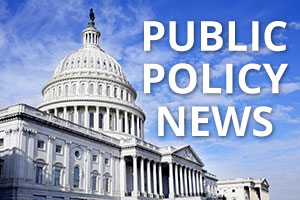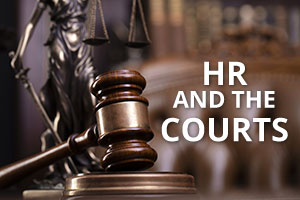by CUPA-HR | June 10, 2025
Each month, CUPA-HR General Counsel Ira Shepard provides an overview of several labor and employment law cases and regulatory actions with implications for the higher ed workplace. Here’s the latest from Ira.
Federal Court Allows Nationwide Class Action Alleging AI Age Discrimination To Proceed
A federal court recently ruled that Workday’s artificial intelligence scoring algorithm for screening job applicants meets the standard to conclude that it may violate the Age Discrimination in Employment Act (ADEA) in discriminating against older job applicants. The court ruled that the nationwide class action may proceed (Mobley v. Workday (N.D. Cal. 3:23-cv-00770, 5/16/25)).
While the court has not yet ruled on other allegations, the lawsuit also alleged that the algorithm has an unlawful disparate impact based on race and disability. President Trump has instructed the Equal Employment Opportunity Commission and the Department of Justice not to prosecute disparate impact cases, but this executive order does not apply to private lawsuits or state equal employment opportunity laws.
Conflicting Federal Court Decisions on President Trump’s Executive Order Involving Mass Layoffs and Office Closings at the Education Department’s Office of Civil Rights
On May 22, 2025, a federal court judge in Massachusetts issued a broad injunction prohibiting the mass layoffs and office closings at the Department of Education. The judge ordered the administration to reinstate all laid-off employees, and carry out all duties mandated by U.S. law, including managing student loans, aiding state educational programs and enforcing civil rights laws. The judge ruled that the personnel cuts would likely “cripple the department.” The judge concluded that the president lacked the power to effectively dissolve a federal agency created by Congress by getting rid of employees, closing offices and transferring duties to other agencies (Somerville Public Schools v. Trump (D. Mass. 25-cv-10667, 5/22/25)). The Trump administration will appeal the decision. Learn more.
The day before, on May 21, 2025, a federal court judge in Washington, D.C. denied a private lawsuit to enjoin President Trump’s executive order, which resulted in placing nearly half of the Education Department’s Office for Civil Rights (OCR) staff on administrative leave and closing seven of the OCR’s 12 regional offices. The lawsuit was brought by a group of parents and students and the Council of Parent Attorneys and Advocates. The judge denied the request for a temporary injunction, holding that the plaintiffs lacked appropriate standing to sue and were unlikely to prevail on the merits (Carter v. United States Department of Education (D.D.C. No. 1:25-cv-007044, 5/21/25)).
Presidential Executive Order Disfavors Criminal Enforcement of Federal Agency Rules
An executive order signed by President Trump on May 9, 2025, advised all federal agencies that they should consider civil rather than criminal enforcement of their regulations. This could have a significant impact on the enforcement of federal laws and regulations in the HR field. The Employee Retirement Income Security Act (ERISA), Occupational Safety and Health Administration (OSHA) and the Fair Labor Standards Act (FLSA) all have an optional criminal enforcement capability, which is in addition to the standard civil enforcement typically pursued by the Department of Labor. The executive order also stated that agencies should avoid imposing a “strict liability” standard to their rules. Strict liability allows the government to pursue a person or entity in a situation regardless of intent.
The executive order also requires all agencies to, within one year, provide the Department of Justice with a list of criminal regulatory offenses they are enforcing and the range of the criminal penalties for violation.
Teacher Loses First Amendment Case Against School District After Firing
A federal court recently ruled that the Unified Oakland School Board was immune from a lawsuit by a kindergarten teacher who refused to call a student by the pronouns they use, despite the student’s and parents’ wishes. The teacher claimed that to do so was inconsistent with her religious beliefs and to require her to do so violated her First Amendment right to freedom of religion. The school district had offered the plaintiff several accommodations before termination, including the option to call the student by their first name. The plaintiff refused and was ultimately terminated.
The court dismissed the claim against the school district on sovereign immunity grounds and against individual officials on qualified immunity grounds (Ramirez v. Oakland Unified School District et al. (2025 BL 181443 N.D. Cal., No. 24-cv-09223, LB, 5/27/25)). The plaintiff was given 28 days to file an amended complaint against individual defendants.
The judge also dismissed the teacher’s First Amendment free speech claim, holding that her refusal to use the pronoun the student uses was not protected free speech.
Harvard Wins Temporary Reprieve From Presidential Executive Order Banning Its International Students From Entering the United States
A federal judge issued a temporary restraining order (TRO) barring the government from enforcing a presidential executive order which would have banned Harvard from continuing to enroll foreign students. The judge ruled that it would cause Harvard irreparable harm and issued the TRO barring enforcement of the executive order and ordering that a hearing be held on the issue on June 16, 2025 (Harvard v. U.S. Department of Homeland Security (25-cv-11472, U.S. D Ct. Maa. (Boston) 6/5/25)).
The TRO will be in effect until the June 16, 2025, hearing when the court will hear arguments over whether to extend the injunction. Learn more.
NCAA and Power Five Conferences $2.8 Billion Settlement Proposal of Antitrust, NIL Suit Approved by Federal Judge
On June 7, 2025, Judge Claudia Wilkens of the U.S. District Court for the Northern District of California approved the proposed NCAA and Power Five conferences (the ACC, Big 12, Big Ten, Pac-12, and SEC) settlement of the antitrust lawsuit brought against them for not allowing college athletes to receive payments for name, image and likeness (NIL) related to their college sports status. The judge approved a $2.8 billion settlement proposal to be distributed among student-athletes playing during the 2016-2024 seasons. In addition, the colleges are allowed to share up to 22% of revenue received annually from athletic programs with college athletes — capped at $20.5 million a year — going forward for 10 years. The cap will be adjusted upward by 4% during the first two years of the agreement.
It is estimated that, of the $20.5 million annual cap, about 90% will go to football players and about 10% will go to male basketball players. In addition, NIL payments made by boosters and other sports-related entities are subject to outside review by the accounting firm Deloitte.
Because of the unprecedented and fast-changing pronouncements of the new presidential administration and the intervening court challenges, the developments contained in this blog post are subject to change. Before acting on the legal issues discussed here, please consult your college or university counsel and, as always, act with caution.
Share This Article:



